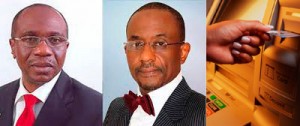
On September 1, free transaction on Automated Teller Machine (ATM), which bank customers have enjoyed for about two years ended. In spite of the reasons alluded by the Central Bank of Nigeria (CBN), the policy has attracted terse and negative commentaries.
CBN on August 20 had directed all banks to revert to charging customers transaction fee whenever they use their ATM cards in machines of other banks. Whatever that means; CBN says the policy summersault is aimed at preventing abuse by customers.

It said that since the introduction of the free ATM transaction, the volume of ATM transaction has increased, and this has brought undue pressure on the machines.
Also, the cost of maintaining ATM is expensive and requires economic incentive for owners to deploy and maintain them.

Indeed, some customers were beginning to abuse the use of ATMs through countless daily withdrawals. This led to increase in cash transactions, which negate the bank’s cashless policy.
Maintaining ATM is expensive and it requires economic incentive for owners to deploy and maintain these machines.
If a part of this cost goes unabated, the banks may be forced to reject transactions coming from their customers at another bank ATMs, thereby frustrating the interoperability of payment systems,” it said.
Even with these reasons, the civil society groups have threatened to resist the policy, dubbing it anti-customers and inconsiderate.
The heated debate on the policy prompted the apex bank to throw more light on the wisdom behind the introduction of the measures.
According to the banking regulating body, cash withdrawal at the ATMs of a customer’s bank is free and that the N65 charge only applies when a customer withdraws cash from another bank’s ATM other than that of his/her bank. The N65 charge starts to apply from the fourth transaction at another banks’ ATM in a month.
“Remote-on-us’ transaction is when a card holder goes to the ATM machine of another bank other than his or her own bank to make a withdrawal.
In December 2012, the CBN, in collaboration with the Bankers’ Committee, transferred the payment of N100 fee on “Remote-on-us” ATM cash withdrawal transactions to issuing banks.
The Nl00 was never removed. It was only transferred to customer’s bank to pay, and this was intended to encourage/promote the use of ATMs nationwide. Having sufficiently raised customers awareness, the first three “Remote-on-Us” transactions in a month are free for the card holder but paid for by the issuing bank The N65 charge only applies when a customer withdraws cash from another bank’s ATM other than that of his/her bank. The N65 starts to apply from the fourth transaction at another banks’ ATM in a month. The charge is not intended to discourage financial inclusion. The CBN will not endorse any anti-customer policy. Charging fees on interbank networks is an acceptable practice globally,” CBN said.
But the Centre for Social Justice, a civil society group, whose co-ordinator is Eze Onyekpere threw the first salvo. He said there is no justification to reintroduce any money, no matter how small, to ATM transactions.
The CBN governor in unveiling his agenda in June when he took office vowed to mainstream poverty reduction, job creation and the development agenda in monetary policy. How will this new step further the goals? Clearly, this is a retrogressive step that will unduly burden bank customers, discourage the unbanked from using the banking system and also negates the cash-lite policy. It negates Nigeria’s international and domestic economic and social rights obligations especially as provided in Chapter 2 of the 1999 Constitution and the obligations under article 2(1) of the Covenant on Economic, Social and Cultural Rights of the United Nations to respect already guaranteed rights and not to take steps to repeal or call back existing rights. The obligation is ‘forward ever’ for the continuous improvement of existing conditions rather than the backward steps taken by the CBN.
This CBN policy questions the basis and concept of regulation in an economy.
What should regulators take cognizance of in arriving at policy decisions? Should regulation simply be for the benefit of the strong, the rich and the accentuation of inequality? The regulator from our understanding should consider the interest of all the parties that will be affected by regulation and try to balance out any conflicts by apportioning obligations on those best positioned to bear them. We are living witnesses to the fantastic profits declared by banks since 2012 and there is no credible suggestion backed by empirical evidence that banks balance sheets have been unduly impaired by their bearing the charges.
This new policy is an apparent evidence of regulatory capture. Essentially, the regulator has been captured by the core institutions it is supposed to regulate. It is regrettable that the banks which collect deposits from customers with little or no interest on saving; charge double digit interest rates on lending, turns around to force the arms of CBN into ensuring extra charges from ATM withdrawals alongside the bank charges and commissions placed on customers, such as ATM issuance and maintenance fees, N50 charges on SMS alerts, emails, print of account statements, etc. It will therefore not be out of place to ask; what services do the banks specifically render to customers aside the safe keeping of customer’s cash?
It appears that in this instance, the appointment of a former director of a mainstream bank is leading to a policy in favour of his original constituency and colleagues in the industry without taking cognizance of the bigger picture of the rights of the Nigerian people who are ultimately his employer. It is imperative to remind the CBN that it has a legal and moral duty to protect the banking public from the extortion of deposit money banks. If ATMs have become the personal purse of the banking public as claimed by CBN, it means that the cashless policy is working.
Policies should not be reversed simply for the fact that the author of the policy has left office. Whatever that is positive from the Sanusi era should not be rubbished simply because Sanusi has left office. Take the positives and leave the negatives; the removal of the charge is surely one of the positive signals that came out of the Sanusi era and should be continued.
The CSJ calls for the urgent reconsideration of the new policy to allow the status quo to remain and therefore stop the removal the newly introduced ATM charges.
This will give a good signal to the Nigerian banking public of the sincerity of the new CBN governor to walk the talk, thereby achieving credibility through policy consistency. If the CBN cannot use its policy to facilitate the improvement of living conditions, it has no obligation to increase the burden on the people. For now, let the status quo remain” Onyekpere, said.
National Co-ordinator of Human Rights Writers Association of Nigeria (HURIWA) and former Federal Commissioner of the Nigerian National Human Rights Commission (NHRC), Comrade Emmanuel Onwubiko, insisted that CBN should reverse the policy, saying that it is hurtful and illegal and should be cancelled.
“We are shocked that the first landmark policy decision by the new Central Bank of Nigeria Governor, Mr. Emefiele is the anti-people and illegal N65 charge that bank depositors/customers are compelled to cough out at every Automated Teller Machine (ATM) transaction. It is so very unfair and discouraging that the CBN is coming up with this bizarre policy when the same bank spent huge financial resources on publicity and commercial advertisements to lure Nigerian bank customers to embrace the electronic banking practices.
The immediate past CBN governor spent so much of public fund in the custody of the CBN to campaign for the acceptance of the newly introduced electronic banking services or what the Central Bank cleverly code named ‘cashless economy’. How do you explain that the same institution that embarked on this widespread publicity bonanza to market a product such as cashless economy will at the same time tax customers this illegal fees to access these same services for which the Central Bank spent to convince significant percentage of Nigerians to embrace. The CBN governor has also not started well by letting those same top bank chiefs retired by the immediate past CBN governor for spending up to 10 years to make a sensational comeback.
The bank chief first and foremost allowed his erstwhile boss in his former place of work to sneak right back into the prestigious position of chairman of that bank and again another of the big fishes eased out during the tenure of the immediate past CBN Governor is staging a comeback as chairman of United Bank for Africa. It seems the new CBN Governor has the primary duty of rewarding both the banking institutions and the owners through a combination of introduction of this ATM charge and then secondly by letting them have soft landing by returning them to their former plum positions as if these bank chieftains are the only Nigerians alive that can chair these banks.
The CBN governor must quickly prove to Nigerians that he is not in office to serve the interest of his political and economic masters. He must introduce pro-masses banking policies and measures to encourage the small and medium scale entrepreneurial ventures (SME’s) and also support the real manufacturing sector of the economy. Besides, he must tackle insider fraud going on right under his nose in most of these commercial banks to save our economy from undue capital flight occasioned by the incidence of money laundering by top political office holders and other politically exposed Nigerians including their foreign collaborators.
Unemployment and the collapse of local industry should occupy and dominate the focus of the administration of the current CBN governor if ever he hopes to make lasting impact while he serves as Nigeria’s top banking regulator.
The CBN governor must cancel this outrageous ATM fee of N65 immediately or the civil society organizations will be left with no option than to mobilize the civil populace to stage protests to register their disgust at this and many other increasingly anti-poor policies of this new CBN governor,” he said.
However, Mr. Odilim Enwegbara, an economist thinks differently. While endorsing the reintroduction, he reasoned that it will increase e-transfer and e-transaction, so fraudulent practices will be reduced. But he suggested that the fee should not exceed N50.
“I think that the reintroduction has become inevitable if ATM users don’t expect empty machines. It also should discourage usage of ATM and encourage e-payments, which involves no physical movement of cash. Banks want as less as possible movement of naira, which they need in order to create money by just assigning themselves certain amount of naira without having it physically. Increased e-transfer and e-transaction will curtail fraud as well as enable law enforcement and security operatives trace movement of criminals and terrorists. It will interest us to know that there are parts of the world where even hotels don’t accept cash payment. So, I am in support of the reintroduction of ATM charges proposed by the CBN. But the fee shouldn’t exceed N50.”
Also, a customer, Mr Gbola Subair said the introduction of charges on ATM will not encourage financial inclusion policy which is the brainchild of the apex bank. Even when the transaction on ATM was free, not many people had ATM cards, not to talk of transacting business with ATM.
Alhaji Mohammed Hassan, a bank customer, remarked that the penetration of ATM usage is still low in the rural areas even with free ATM transaction. So, he cannot imagine now that they have to pay for using the system. “What should bother the CBN governor is how to create awareness on the usage of ATM and not seek for ways to discourage usage.”
 MMS PLUS NG – Maritime, Aviation, Business, Oil and Gas News Online Newspaper with coverage in Maritime, Oil and Gas, Aviation, Power and Energy as well as Financial News
MMS PLUS NG – Maritime, Aviation, Business, Oil and Gas News Online Newspaper with coverage in Maritime, Oil and Gas, Aviation, Power and Energy as well as Financial News









